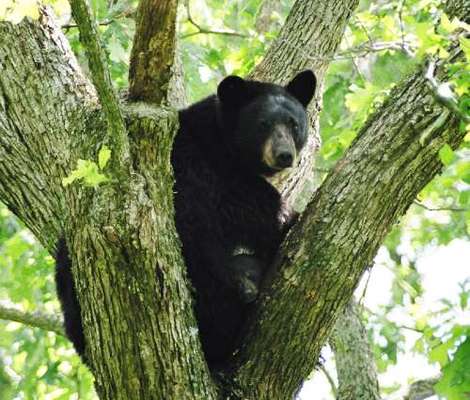|
Bears aren't usually thought of as tropical animals, but Florida is home to a subspecies of Black Bear called (surprise!) the Florida Black Bear (Ursus americanus floridanus)--in fact, it's our largest land mammal. In the early years of human settlement in Florida, we shared the state with approximately 11,000 bears.
Around 1970, as a result of hunting and habitat loss, Florida's bear population was down to less than 500 individuals. In an effort to help populations recover, bear hunting was banned in most areas in 1971 (the few remaining areas were closed in 1994). The study that convinced Florida officials to adopt a universal ban in 1994 found that the public didn't understand why the state would allow hunting of a threatened species, and that over 60 percent of Floridians opposed a hunting season for Florida's bears. Since then, bears have begun to recover. Estimates in 2002 suggest a statewide population of between 2,500 and 3,000, divided into seven fairly distinct subpopulations (some--but not all--of which are recovering well). Florida Black Bears were listed as a threatened species by the state from 1974 to 2012, and were delisted because it was judged that the population was no longer at substantial risk of extinction (though it's still illegal to kill them under a different state rule). While their recovery is great news, bears currently occupy only 18 percent of their historic range and exist at only a fraction of their former abundance. We know that apex predators play an important part in healthy ecosystems, and so caring for the natural world in Florida includes helping to ensure a robust population of Florida Black Bears. Unfortunately, particularly in parts of central Florida, conflicts between bear populations and humans are growing. Suburbs of Orlando back up to Ocala National Forest, and in this area we've seen increasing unwanted interactions, including a few attacks. FWC reports that there have been 16 attacks on humans by Florida Black Bears since 1976, but at least half were provoked by the humans (who attempt to hand feed or hit a bear) and 80% resulted in relatively minor injuries--black bears are not generally aggressive. However, in places where houses are built on the edge of the forest, bears are likely to be attracted by the availability of garbage as a snack, and may lose some of their natural fear of humans. In part as a result of media coverage of these events, the Florida Fish and Wildlife Conservation Commission has proposed reopening a hunting season for the Florida Black Bear to reduce. While some hunting of bears may eventually be sustainable, populations are still relatively small. Moreover, a hunting season would be unlikely to address problems with "nuisance" bears--hunters won't be hunting in the suburbs. It makes more sense to begin considering ways we can more effectively coexist with wildlife. In this case, better waste management processes and a requirement for bear-proof trash cans in some areas would do more to reduce human-bear conflict than a bear hunt possibly could--bear resistant cans can reduce bear interactions with garbage by 95 percent, giving them no reason to occupy areas inhabited by humans. The FWC is currently seeking public comment on the proposed reopening of a hunting season for black bears in Florida in preparation for their next meeting in April. If you want to learn more, you can look over the presentation from the February commission meeting, or you can share your opinion with them here.
5 Comments
|
Field Notes
Archives
July 2021
Categories |
|
Partner with us! We are always looking for new schools, scientists, and non-profit organizations to partner with. Please contact us here to start a conversation.
Hear from us! Sign up for our newsletter to hear about what is happening at Field School as well as upcoming offers and specials. |


 RSS Feed
RSS Feed